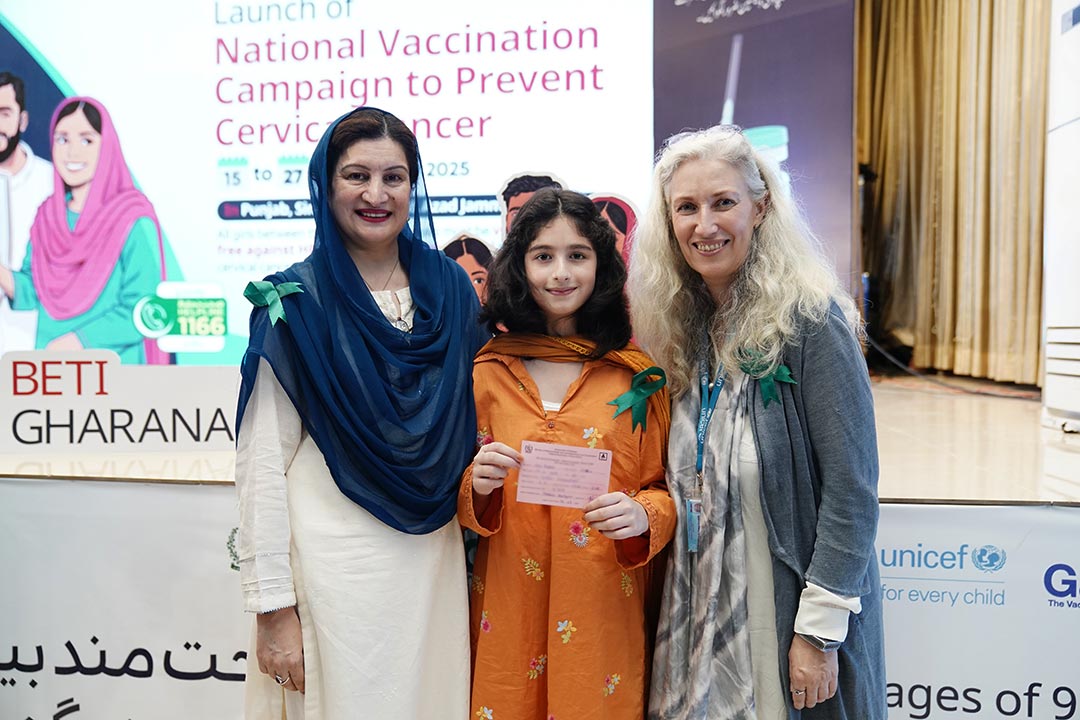Islamabad, 15 September 2025 – The Government of Pakistan’s Federal Directorate for Immunization (FDI), in partnership with Gavi, the Vaccine Alliance (Gavi), UNICEF and the World Health Organization (WHO), today launched the human papillomavirus (HPV) vaccination campaign to protect adolescent girls from cervical cancer in later stages of their lives. This marks a major leap forward in strengthening women’s health and advancing Pakistan’s commitment to eliminate cervical cancer as a public health problem by 2030.
The HPV vaccination campaign will target girls aged 9–14 years across Punjab, Sindh, Pakistan-Administered Kashmir and Islamabad Capital Territory in the first phase, beginning on 15 September 2025. The goal is to vaccinate at least 90% of 13 million eligible girls during this campaign and integrate the vaccine into routine immunization for 9-year-old girls in subsequent years.
Speaking at the launch, the Federal Minister for Health, Syed Mustafa Kamal, said that the Government is fully committed to protecting young girls from cervical cancer through preventive measures. “This vaccination drive for girls aged 9 to 14 years is an important step towards safeguarding their future health,” he stated.
Appealing directly to parents, the Minister said, “I urge all parents to ensure their daughters and sisters are vaccinated. Sadly, there is false propaganda being spread about this vaccine which has no basis in reality. Do not fall prey to negative campaigns. This vaccine is safe, effective and essential for protecting our girls.”
He added that ensuring a healthier future for daughters is a shared responsibility: “Every mother should prioritize her daughter’s health and life. Our duty is to raise awareness, and we are fully committed to it.”
The HPV vaccination campaign will be conducted at fixed centers, outreach, schools and through mobile/special vaccination teams. Outreach vaccination sites will be established in distant areas, and special vaccination teams will be deployed to reach high-risk and under-served populations. The HPV vaccine will be available for free for all eligible girls.
“A single dose of the HPV vaccine can prevent most cases of cervical cancer. Yet every two minutes, a woman loses her life to this disease, including thousands in Pakistan each year,” said Thabani Maphosa, Chief Country Delivery Officer at Gavi, the Vaccine Alliance. “Thanks to the leadership of the Government of Pakistan and the commitment of our partners, we now have the chance to reshape the future of women’s health in the country, giving millions of girls the power to protect their lives and pursue their dreams.”
Over 60 million girls across the world have been vaccinated against HPV with Gavi support to date. Today’s vaccine introduction will build on this progress and contribute towards the Alliance’s goal of reaching 86 million girls living in lower-income countries by the end of 2025, helping to prevent over 1.4 million future deaths from cervical cancer.
“Today marks a historic step for Pakistan’s girls and young women. The HPV vaccine can protect millions of women of tomorrow from a preventable and life-threatening disease by vaccinating the girls of today and giving them the chance to grow, learn and thrive without the fear of cervical cancer. UNICEF is proud to work with the Government of Pakistan and alongside our partners WHO and Gavi for the health of future generations,” said Pernille Ironside, UNICEF Representative in Pakistan.
“In Pakistan, we lose 8 women every day due to cervical cancer. WHO is proud to work with Pakistan, and partners like Gavi and UNICEF, to protect 13 million of girls from cervical cancer by introducing the human papillomavirus vaccine this September, and to protect over 17 million by 2027. The HPV vaccine, prequalified by WHO, is a safe, science-based and effective protection against cervical cancer, with a long history of saving lives in over 150 countries, including Muslim countries. Providing this vaccine is investing in a healthier future for every girl, for their future families, and for the entire nation,” said WHO Representative in Pakistan Dr Dapeng Luo.
Mild side-effects such as pain in the injected part of the body or a low fever may occur, similar to other vaccines.
Parents, teachers and community leaders are urged to ensure all eligible girls are vaccinated to protect them from cervical cancer for a healthier future.
MEDIA CONTACTS
Cirũ Kariũki, Gavi
+41 79 913 94 41
ckariuki@gavi.org
Meg Sharafudeen, Gavi
+41 79 711 55 54
msharafudeen@gavi.org
Karen Reidy, UNICEF Pakistan
+92 203 828 4385
kreidy@unicef.org
Abdul Sami Malik, UNICEF Pakistan
+92 300 855 6654
asmalik@unicef.org
Dr José Ignacio Martín Galán, WHO Pakistan
Head of Communications
jomartin@who.int

